MARK GRIFFITH is professor of classics and of theater, dance, and performance studies at the University of California, Berkeley.
GLENN W. MOST is professor of ancient Greek at the Scuola Normale Superiore at Pisa and a visiting member of the Committee on Social Thought at the University of Chicago.
DAVID GRENE (19132002) taught classics for many years at the University of Chicago.
RICHMOND LATTIMORE (19061984), professor of Greek at Bryn Mawr College, was a poet and translator best known for his translations of the Greek classics, especially his versions of the Iliad and the Odyssey.
The University of Chicago Press, Chicago 60637
The University of Chicago Press, Ltd., London
2013 by The University of Chicago
The Libation Bearers 1953, 2013 by the University of Chicago
Sophocles, Electra 1957, 2013 by the University of Chicago
Iphigenia among the Taurians 2013 by Anne Carson
Euripides, Electra 1959, 2013 by the University of Chicago
The Trojan Women 1947 by the Dial Press;
1958, 2013 by the University of Chicago
All rights reserved. Published 2013.
Printed in the United States of America
22 21 20 19 18 17 16 15 14 13 1 2 3 4 5
ISBN-13: 978-0-226-03545-1 (cloth)
ISBN-13: 978-0-226-03559-8 (paper)
ISBN-13: 978-0-226-03562-8 (e-book)
Library of Congress Cataloging-in-Publication Data
Greek tragedies / edited by David Grene and Richmond Lattimore. Third edition / edited by Mark Griffith and Glenn W. Most.
pages. cm.
ISBN 978-0-226-03514-7 (cloth : alk. paper) ISBN 978-0-226-03528-4 (pbk. : alk. paper) ISBN 978-0-226-03531-4 (e-book) ISBN 978-0-226-03545-1 (cloth : alk. paper) ISBN 978-0-226-03559-8 (pbk. : alk. paper) ISBN 978-0-226-03562-8 (e-book) ISBN 978-0-226-03576-5 (cloth : alk. paper) ISBN 978-0-226-03593-2 (pbk. : alk. paper) ISBN 978-0-226-03609-0 (e-book) 1. Greek drama (Tragedy) I. Grene, David. II. Lattimore, Richmond, 19061984. III. Wyckoff, Elizabeth, 1915IV. Most, Glenn W. V. Griffith, Mark (Classicist) VI. Sophocles. Antigone. English. 2013. VII. Sophocles. Oedipus Rex. English. 2013. VIII. Aeschylus. Agamemnon. English. 2013. IX. Aeschylus. Prometheus bound. English. 2013. X. Euripides. Hippolytus. English. 2013.
PA3626.A2G57 2013
882'.0108dc23
2012044399
 This paper meets the requirements of ANSI/NISO Z39.481992 (Permanence of Paper).
This paper meets the requirements of ANSI/NISO Z39.481992 (Permanence of Paper).
CONTENTS
Translated by Richmond Lattimore
Translated by David Grene
Translated by Anne Carson
Translated by Emily Townsend Vermeule
Translated by Richmond Lattimore
AESCHYLUS
Translated by Richmond Lattimore
INTRODUCTION TO AESCHYLUS THE LIBATION BEARERS
The Libation Bearers is the second tragedy in Aeschylus Oresteia (Agamemnon, The Libation Bearers, The Eumenides), which was produced in 458 BCE. Each play of the trilogy can be studied and interpreted as an independent drama, separately from the other two.
The dramatic time is some ten years after Agamemnon. Clytaemestra and Aegisthus rule in Argos, oppressing Electra, the daughter of Clytaemestra and Agamemnon, and tyrannizing the citizens. Electra has remained loyal to her fathers memory, and hopes for revenge. Orestes, her brother, has grown up in exile, likewise contemplating vengeance on his fathers killers. He returns with his comrade Pylades, is recognized by Electra, and with Electras help plots, and himself carries out, the murder of Clytaemestra and Aegisthus.
Sophocles in his Electra and Euripides in his Electra told the same story. The important features special to Aeschylus are as follows. The recognition is begun through Electras identification of a lock of her brothers hair, deposited on Agamemnons tomb, and of his footprints. The brother and sister, with the chorus of Clytaemestras slave women, speak and chant a long invocation to the spirit of Agamemnon and the gods of the earth, working themselves up to an act of which they sense the horror. Electra then leaves the stage, does not reappear, and takes no further part in the action. Aegisthus is killed first, offstage, and Orestes confronts Clytaemestra before the audience, then forces her inside the palace and kills her there. At the end, Orestes cannot enjoy his triumph. As he stands over the corpses, justifying his act, the horror comes upon him and his mind sees the Furies of his mother (the Erinyes, or Eumenides), who pursue him from the stage. The story of this pursuit and the eventual release of Orestes is told in The Eumenides.
All three dramatists have made the murders be accomplished by deception. Orestes presents himself disguised and is not recognized at first by his mother and her husband. In Aeschylus, the intrigue is reduced to its simplest terms. Much of the tragedys force comes from the spellbinding rhythms and imagery of the invocation and the choral odes.
THE LIBATION BEARERS
Characters
ORESTES, son of Agamemnon and Clytaemestra
PYLADES, his friend
ELECTRA, his sister
CHORUS of Asian serving-women
A SERVANT (doorkeeper)
CLYTAEMESTRA, queen of Argos; now wife of Aegisthus
THE NURSE, Cilissa
AEGISTHUS, now king of Argos
A FOLLOWER of Aegisthus
Scene: Argos, in front of the palace.
(Enter Orestes and Pylades, from the side.)
ORESTES
Hermes, lord of the dead, you who watch over the powers |
of my fathers, be my savior and stand by my claim. |
Here is my own soil that I walk. I have come home; |
and by this mounded gravebank I invoke my father |
| to hear, to listen. |
He met his end in violence through a womans treacherous tricks |
Here is a lock of hair for Inachus, who made |
me grow to manhood. Here a strand to mark my grief. |
I was not by, my father, to mourn for your death |
nor stretched my hand out when they took your corpse away. |
(Enter the Chorus, with Electra, from the other side.)
| But what can this mean that I see, this group that comes |
of women veiled in dignities of black? At what |
sudden occurrence can I guess? Is this some new |
wound struck into our house? I think they bring these urns |
to pour, in my fathers honor, to appease the powers |
| below. Can I be right? Surely, I think I see |
Electra, my own sister, walk in bitter show |
of mourning. Zeus, Zeus, grant me vengeance for my fathers |
murder. Stand and fight beside me, of your grace. |
Pylades, stand we out of their way. So may I learn |
| the meaning of these women; what their prayer would ask. |
(Orestes and Pylades conceal themselves, to one side.)
CHORUS [singing]
STROPHE A
I came in haste out of the house |
to carry libations, hurt by the hard stroke of hands. |
My cheek shows bright, ripped in the bloody furrows |
| of nails gashing the skin. |
This is my life: to feed the heart on hard-drawn breath. |
And in my grief, with splitting weft |

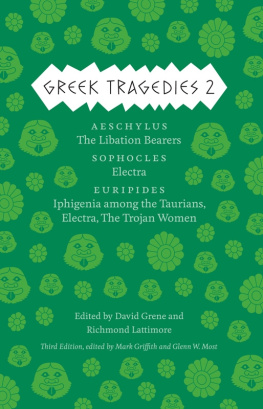
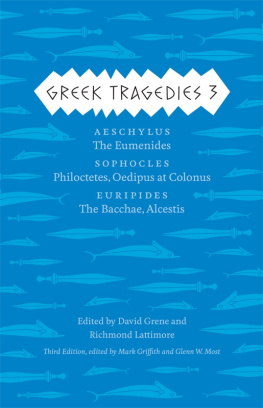
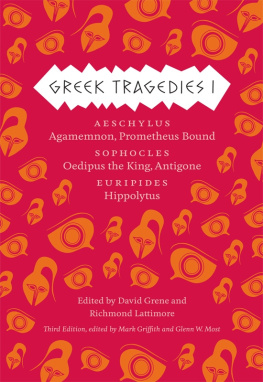

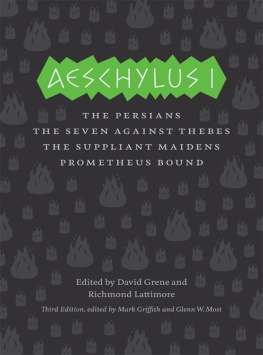
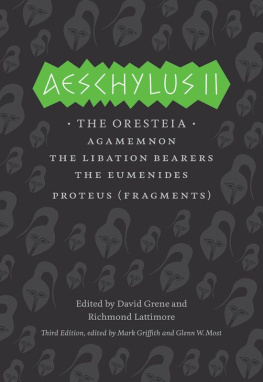
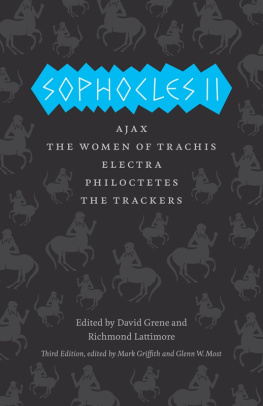
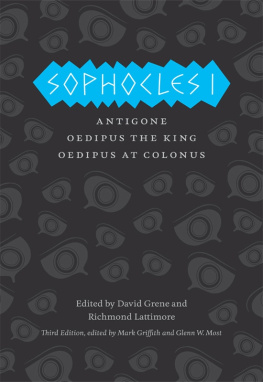
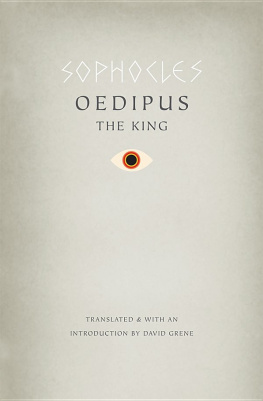
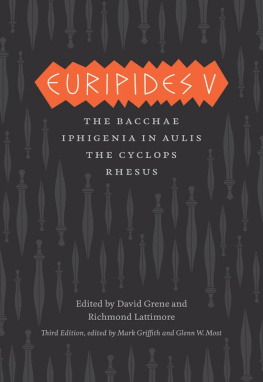
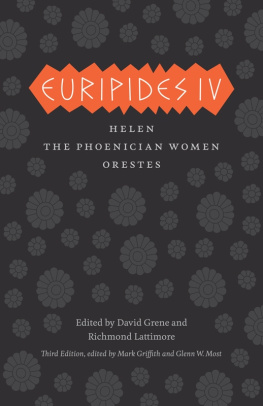
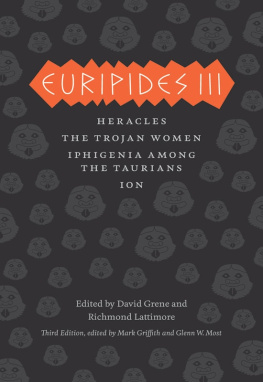
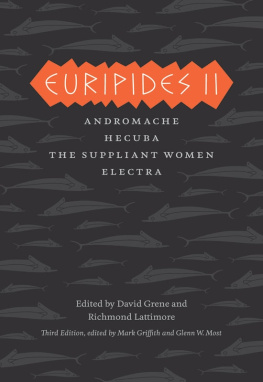
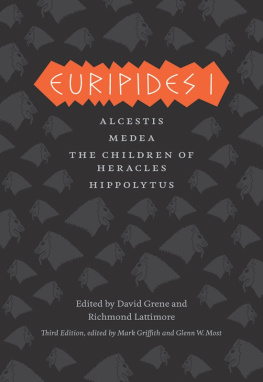
 This paper meets the requirements of ANSI/NISO Z39.481992 (Permanence of Paper).
This paper meets the requirements of ANSI/NISO Z39.481992 (Permanence of Paper).